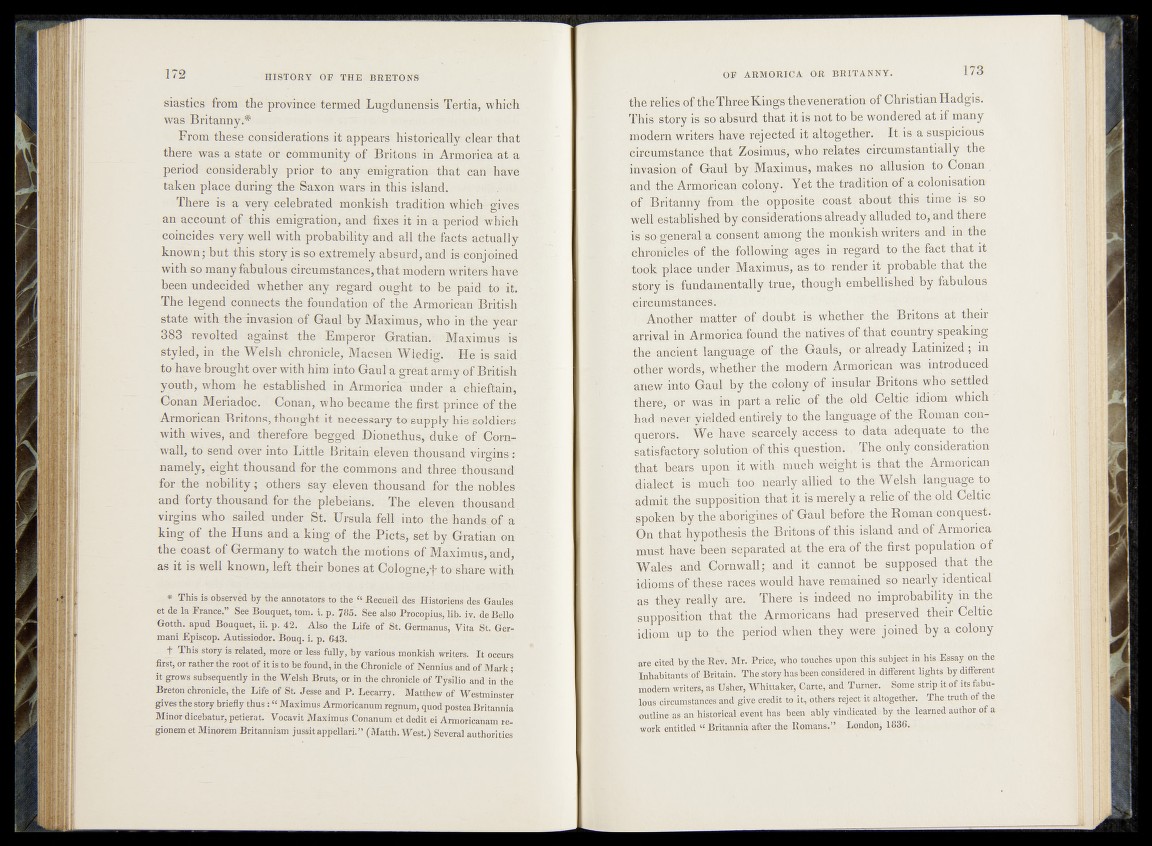
siastios from the'province termed Lugdunensis Tertia, which
was Britanny.*
From these considerations it appears historically clear that
there was a state or community of Britons'in Armorica at a
period considerably prior to any emigration that can have
taken place during the Saxon wars in this island. y?.
There is a very, celebrated monkish tradition which-g-ives
an account of this emigration, and fixes it in a period which
coincides very well with probability and all the facts actually
known; but this storyjs so extremely absurd, andi'is conjoined
with so many fabulous circumstances, that modern w riters have
been undecided whether any regard, ought to be paid'.to-it.
The legend connects the foundation of the Armorican British
state with therinvasion of Gaul by Maximus, who in the-year
383 revolted against the Emperor Gratian. Maximus is
Styled, in the Welsh chronicle, Màüsêh Wle<|ig, He is-sai'd
to have brought over with him into Gaul a great àrmy of British
youth, whom he established in Armorica'under a.éhîeftâ'irf-
Gonan Meriadoc. Conan, who became the first prince è f the
Armorican Britons, thought it necessary to supply his soldiers
with wives, and - therefore begged Dionethus,* duke-of- Cornwall,
to send over into L itf e Britain eleven thousandwirgins :
namely, eight thousand for the commons and .three thousand
for the nobility; others say éleven thousand Jor: the nobles
and forty thousand for thé plebeians. The eleven thousand,
virgins who sailed hnder St. Ursula fell into the hand^pf a
king of the Huns and. a king, of | the -Piets, set'by Gratian on
the coast of Germany to watch the motions, of Maximiis,vand;
as it is well known, left their bones at Cologne,f to share with
* This is observed by the annotators to the « Recueil des Historiens des Gaules
et de la France.” See Bouquet, tom. i. p.,78â. See also. Procopius, lib. iv. de Bello
Gotth. apud Bouquet, ii. p. 42. Also the Life o f 'St. Germanus, Vita St. Ger-
mani Episcop. Autissiodor. Bôuq. i. p. 643.
f This story is related,'more or less fully, by various monkish writers. I t .occurs
firat, or rather the root of it is to be found, in the Chronicle of Nennius and of Mark ;
it grows subsequently in the Welsh Bruts, or in the chronicle of Tysilio and in the
Breton chronicle, the Life of St. Jesse and P. LeCarry. ’ Matthew of Westminster
givesthe story briefly thus': « Maximus Armoricanum regnum, quod postea Britannia
Minor dicebatur, petierat. Vocavit'Maximus.'Conahum et dédit ei Armoricanam re?.
gionemetMinoremBritanniam jussitappeilari.” (Matth. West.) Several authorities
thc relics of the Three Kings the veneration of Christian Hadgis.
This story is so absurd that it is riot to be wondered at if many
modern writers have rejected it altogether. It, is a suspicious
circumstance ■ that Zosimus, who relates circumstantially the
invasion of Gaul b y Maximus, m ak e sn o allusion to Conan .
and the Armorican colony a j-Yfet the tradition of a colonisation1
of Britanny Ö.0111 . thel,?bp‘ppsiltë| coast, about this .time is.1 so
well-established hy;eöjnsideratiqns alreadf' alluded and there
isfsp/general a consent among-the« monkis-hiwriters and in the
chronicles; of the following-'ages in regard-to the fact that it
topk place-under Maximus, as to . render.1 it1 probable that the
Story is fundamentally true, though embellished by fabulous
circuMstances^ 1 *
■ Anothér matter pf doub^is whether, the Britons at their
arrival in Ariihbficaiföund the nativdlibf that countryspeaking
the ancient language- ofi the Gauls, . or already Latinized ; in
ofchpri words, whether/tfeë «modern Armoricamwas introduced
anew into Gaul by ,th®|colony^of insular Britonsnwho settled
there, or was/tö part a relic Sjrf thëyold^Celric jidiom, which
h è ln e v e r^ k d è d |k ire ly to,the languag^ófdhc Roimameon-
qupröTë. ^e^have^careely;aCéeë#^o d a ta ! adequate to the
^tis-factorycsblSridn^pf thiè^’q u ^ tian '., The only consideration
that • bedrs upbnjrit with- niuch weight'is -that thë .Armorican
dialect 'is much: too, dearly allied^ to the Welsh;-language to
admit the;|fi'ppositiqn that it js'merely a ^ I cm f th e old Celtic
sp’öked, byithe.aborigines öf'Gaut^bhfore th e Roman cqnquest.-
On that hypothesis the Britonsof this island and of Armorica
must have beemsépèirated at the era of the first^population of
Wales- arid Cprnwall; and it canncd-bh supposed that the
idioms of these races would have .remained so nearly identical
as they really are. There is indeed no improbability m the
supposition that the Armoricans had preserved their Celtic
idiom up to the period when they, wbre:j;q£n6d b y a.vcolony
are cited b$*theRev. Mr. Price, wko,t$uijihes upon\tliis subjecten his Essay on-the
Inhabitants'of Britain. The story has been considered.in different lights by different
^ d e m writers, as Usher, Whittaker, Carte, and Turner. ««Some strip it of its fabulous
circumstances aqd‘ give credit tcrfq.ofliers rejeefit altogether. The truth.of the
j^tfline as an historical «vent has been ably vindicated| by the learned author of a
work entitled “ Britannia after the Romans.’! London^ 1836.